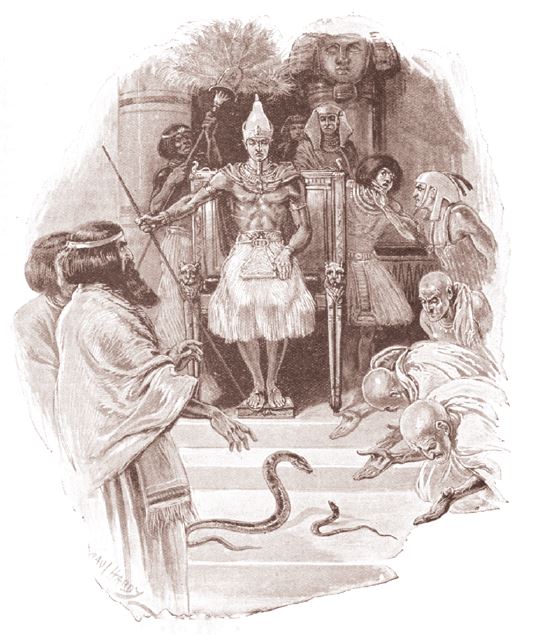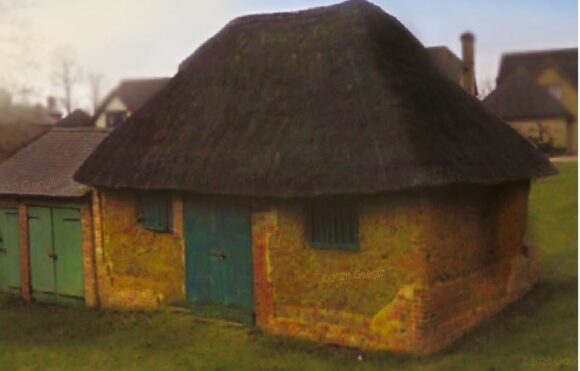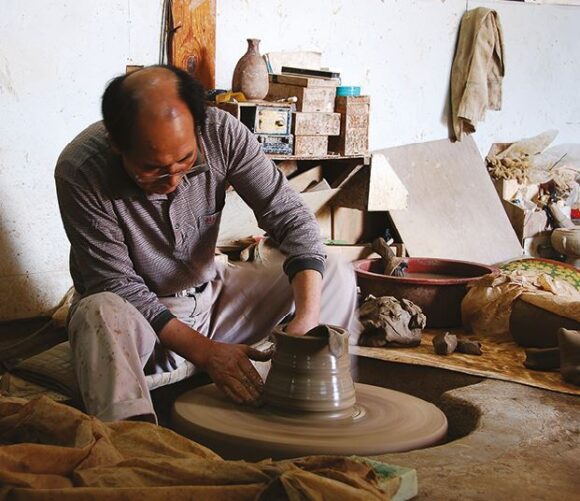IN THE Northamptonshire village where we live there are some very unusual walls. Some are garden walls, surrounding flower beds and lawns. Others form the sides of houses. All of them are centuries old. When you look at them closely, you see they are made of mud and chopped straw. In fact, our village walls have a strange connection with the life of the Israelites in Egypt in the time of Moses. They are made of just the same ingredients as the bricks the Israelites were forced to make for Pharaoh.
There are examples of Egyptian bricks in the British Museum in London, complete with the official stamp of the Rameses brickworks—bricks which date back to the time of the Exodus and could easily be the very ones handled by Moses’ brothers as they bowed under the lash of the overseers. The composition is clearly visible.
You may be puzzled by the use of straw. The subject came to the forefront in the battle Moses fought with the Egyptian king. When he first asked permission for his people to be set free, Pharaoh responded by increasing the workload of the Israelites. When the Israelite foremen complained, he became angry. “You are idle, you are idle” he shouted (Exodus 5:17). Now he directed that instead of straw being provided ready to hand at the brickworks to mix with the clay, the Israelites should go out to find it themselves in the countryside.
Why did they mix straw with the clay? The bricks were made from the mud left behind when the River Nile retreated after its annual flooding. It was trodden underfoot to make it pliable, then the straw was mixed in, and it was shaped in rectangular moulds and left to dry in the sun. There are some fascinating cameos of the ancient Egyptian brick industry on the walls of a large rock tomb at Thebes, showing the whole process, from cutting the clay to building a wall with the finished product. The point about the straw is that when mixed with the mud, it gives a better- quality sun-dried brick. According to the experts, the straw produces gallo-tannic acids, which reduce shrinkage and increase the density, hardness, and strength of the brick. This detail adds life and colour to the Exodus account in the Bible, and shows that the chronicler really knew what he was talking about. He had seen it happen.

The Finger of God
Moses’ intervention on behalf of the Israelites followed a stormy course. To give Pharaoh a foretaste of the power of Israel’s God, he performed one of the miracles God had given him to do. He threw his shepherd’s rod on the ground. It promptly turned into a snake. But Pharaoh was not impressed, because his own magicians managed to produce a credible imitation. Moses then stretched out his rod over the Nile and its canals, turning the water a foul blood-red. It could not be drunk until it had been filtered through sand (Exodus 7:20, 24). Again, the court magicians copied the miracle with their enchantments. At the third demonstration, a week later, a vast population of frogs came out of the Nile and crawled or hopped everywhere in the streets of the capital. Still Pharaoh was unconvinced, for his sorcerers achieved the same results. It was developing into a contest between Israel’s God, and the powers of Egypt.
We are told the names of Pharaoh’s henchmen in the New Testament, in Paul’s letter to Timothy: ‘Just as Jannes and Jambres opposed Moses, so these men also oppose the truth, men corrupted in mind and disqualified regarding the faith’ (2 Timothy 3:8). Paul was referring to false Christians who were setting themselves up as genuine apostles and leading astray factions in the church. ‘But they will not get very far, for their folly will be plain to all, as was that of those two men’ (v. 9).
The contest ended with the disgrace of Moses’ opponents. The next miracle beat them. When Moses turned the dust of the earth into an epidemic of lice, crawling miserably and irritatingly over the flesh of every man in the court, Jannes and Jambres bowed out. ‘This is the finger of God’, they said (Exodus 8:19).
This remark is revealing. Many have managed over the centuries to persuade their contemporaries that they have supernatural powers. Simon the Sorcerer in the Acts of the Apostles is an example (Acts 8:9–10). Usually there are strong financial reasons for their deception. In his prophecy of the condition of the earth at the time of his second coming, Jesus three times warned his disciples not to be taken in by deceivers. ‘For false christs and false prophets will arise and perform great signs and wonders, so as to lead astray, if possible, even the elect’ (Matthew 24:24). God’s greatest miracles are beyond the cleverest of conjurers. The disasters that He brought upon Egypt in quick succession are the only explanation possible for the fact that a nation of slaves escaped from their owners in one night, laden with booty. Pharaoh had come up against the finger of God.
Another miracle lies at the heart of the Christian’s faith in God—the resurrection of Jesus Christ. It is the only explanation possible for the dynamic spread of the Gospel within weeks of his crucifixion. If we patiently and lovingly keep His commandments, God will permit us to taste and feel His powers. ‘They who wait for the Lord shall renew their strength; they shall mount up with wings like eagles; they shall run and not be weary; they shall walk and not faint’ (Isaiah 40:31). It is the wonderful promise of eternal life.
More Plagues
The distressing epidemic of lice was followed by five more disasters which struck at the economic wealth of Egypt. Flies polluted the land, a plague attacked the cattle, and boils broke out on people and beasts. After terrible hailstorms had devastated the crops, the regrowth was devoured by locusts that swarmed in from the eastern desert. These disasters, or ‘plagues’ as they are usually known, were not remarkable for their nature, or even their ferocity. Taken separately, they would happen again over the years. The miracle lay in the timing. Such a concentration of catastrophes could not be due to chance. However much the Egyptians prayed to their many gods, there was no stopping the God of Israel. The country was crippled. Years of maltreatment of Abraham’s descendants were being paid for. ‘They will be afflicted for four hundred years,’ God had told Abraham, ‘but I will bring judgement on the nation that they serve’ (Genesis 15:13–14).
Soon Pharaoh’s advisers were begging him to let the Israelites go free. ‘Let the men go, that they may serve the Lord their God. Do you not yet understand that Egypt is ruined?’ (Exodus 10:7). But he refused to listen.
Pharaoh’s obstinacy was not entirely voluntary. The Bible says that God ‘hardened his heart’ (Exodus 10:20). Some people find it difficult to accept that God can manipulate a man’s will. The fact is, Pharaoh had already proved himself an obtuse, selfish ruler without any regard for his fellow humans. From the start, he had set his merciless heart on getting every ounce of work he could from his Israelite slaves. It is understandable, then, that God should later freeze his attitude in a tight grip so that he could not change his mind. God is our Creator, and he can do with us as He wills. We know none of us deserve life, or any of the blessings He grants even to the most wicked and rebellious people. By prolonging Pharaoh’s resistance, God made the Israelites, the Egyptians, and the surrounding nations aware of His power, His care for the oppressed, and the uselessness of false gods.
In a telling passage in the book of Romans, the Apostle Paul considers this very case—the hardening of Pharaoh’s heart. He comes to this conclusion: ‘Has the potter no right over the clay, to make out of the same lump one vessel for honourable use and another for dishonourable use?’ (Romans 9:21).
He teaches that we have free will to choose whether to obey or disobey God, but only by His permission. It is not our right. If He has given us the opportunity to read His Word and obey it, we must be grateful for this mercy, and seize it with both hands. There is no profit in questioning His treatment of others. God’s wisdom and experience of human clay is far beyond our own. We shall find it is hard enough to imitate His patience and tolerance toward the undeserving. ‘Love your enemies and pray for those who persecute you,’ said Jesus, ‘so that you may be sons of your Father who is in heaven. For he makes his sun rise on the evil and on the good, and sends rain on the just and on the unjust’ (Matthew 5:44–45). Those Egyptians had had long enough to repent. Now the day of reckoning had arrived. God was going to deliver His people from their chains.
David M Pearce



